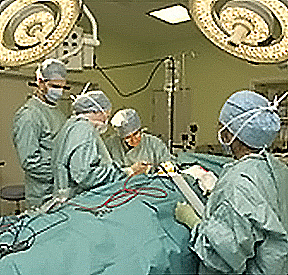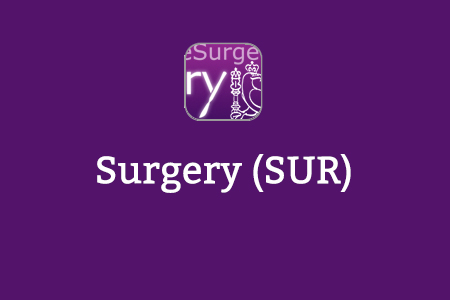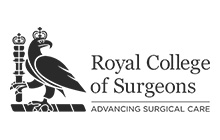About the Surgery programme
 eSurgery is a free elearning resource supporting trainees in their early years of surgical training.
eSurgery is a free elearning resource supporting trainees in their early years of surgical training.This resource will provide a broad theoretical knowledge common to all surgical specialties and help trainees develop the basic knowledge and skills required of a surgeon.
Developed by the Royal College of Surgeons in partnership with Health Education England elearning for healthcare, eSurgery offers interactive elearning sessions structured in modules that map to the Intercollegiate Surgical Curriculum Programme (ISCP). Each session takes around 20 to 30 minutes to complete and learners can work through any module relevant to their training needs, in any order they choose.
The following modules have been updated with new sessions (Dec 2017 and Feb 2018)
- Assessment and Management of Patients with Trauma
- Common Surgical Conditions
eSurgery modules
eSurgery offers elearning sessions structured into modules that map to the ISCP.
These modules cover:
Basic science knowledge relevant to surgical practice
This module covers the scientific basis of surgery, and knowledge in the following topic areas: anatomy, physiology, pharmacology pathological principles, microbiology, diagnostic and interventional radiology.
Common surgical conditions
This module will help you to gain an understanding of common surgical conditions and will equip you with the skills and knowledge required to assess and initiate investigation and management of patients and their transfer to definitive care.
Basic surgical skills
Basic skills in surgery are a fundamental collection of individual skills in which competence is required before undertaking surgical procedures. They include personal preparation for surgery, safe administration of local anesthesia, safe handling of surgical instruments and of tissues, accurate superficial incision and closure, secure knotting, safe use of diathermy, haemostasis of superficial vessels, surgical drain use, principles of anastomosis and principles of endoscopy.
Peri-operative care of the surgical patient
Pre- and post-operative care are just as important to safe patient care as operative expertise. Your key role in the surgical team as a core trainee is to ensure that ward care is safe, any pre-operative risks are minimised and post-operative deterioration is acted upon quickly in collaboration with the critical care team.
Assessment and management of patients with trauma
As a core trainee you need to be able to safely assess the severely injured patient and initiate management of patients with a range of injuries including: traumatic skin and soft tissue injury; chest trauma; head injury; spinal cord injury; abdominal and urogenital trauma; vascular trauma; a single or multiple fractures or dislocations; and burns
Organ and tissue transplantation
This module will help you to gain an understanding of the principles of organ and tissue transplantation, and the assessment of brain stem death and its relevance to continued life support and organ donation.
Project team

Alan Horgan
Project Champion, Professor of Surgical Education, Royal College of Surgeons
Francine Alexander
Director of Learning, Royal College of Surgeons
Andi Blackmore
Project Manager, HEE elearning for healthcare
Agnieszka Gizzi
Education Programme Manager, Royal College of Surgeons
Garry Osmundsen-Little
Learning Designer, HEE elearning for healthcare
Karen Walker
Learning Designer, HEE elearning for healthcare
Paula Casey
Learning Designer, HEE elearning for healthcare
Acknowledgments
The project team would like to thank all those who provided invaluable input into the development of the eSurgery elearning sessions.
How to access
In order to access the Surgery programme, you will need an elfh account. If you do not have one, then you can register by selecting the Register button below.
To view the Surgery programme, select the View button below. If you already have an account with elfh, you will also be able to login and enrol on the programme from the View button.
NHS healthcare staff in England
The Surgery programme is also available to NHS healthcare staff via the Electronic Staff Record (ESR). Accessing this elearning via ESR means that your completions will transfer with you throughout your NHS career.
Further details are available here.
Not an NHS organisation?
If you are not an NHS health or care organisation and therefore do not qualify for free access elfh Hub, you may be able to access the service by creating an OpenAthens account.
To check whether or not you qualify for free access via OpenAthens, you can view the eligibility criteria and register on the ‘OpenAthens’ portal.
Registering large numbers of users
If you are a HR, IT or Practice Manager and would like to register and enrol large numbers of staff within your organisation for access onto the Surgery programme, please contact elfh directly.
Organisations wishing to use their own LMS
For HR departments wanting to know more about gaining access to courses using an existing Learning Management System please contact elfh directly to express interest.
How to license
In the event that you do not qualify for free access to the Surgery programme, you are able to license access through eIntegrity, a community-interest company established for this purpose.
You can check whether or not you qualify for free access by clicking on the ‘Register’ button above.
For more information on the licensing options available for the Surgery programme, please visit the eIntegrity website.
More information
Please select the following link for more information on how to use the elfh Hub.




